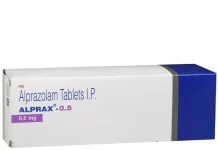Lexapro is a medication commonly prescribed for the treatment of depression and generalized anxiety disorder. It belongs to a class of drugs known as selective serotonin reuptake inhibitors (SSRIs). Here’s information about its uses, benefits, common symptoms, and potential side effects: Lexapro Tablet Uses Benefits and Symptoms Side Effects
Uses and Benefits of Lexapro:
- Depression: Lexapro is used to treat major depressive disorder, a condition characterized by persistent feelings of sadness, loss of interest or pleasure, changes in appetite or sleep patterns, and difficulty concentrating or making decisions.
- Generalized Anxiety Disorder (GAD): Lexapro is also used for the treatment of generalized anxiety disorder, which involves excessive worry and anxiety about various aspects of life, often accompanied by physical symptoms such as restlessness, muscle tension, and fatigue.
- Other Anxiety Disorders: Lexapro may be prescribed off-label for the treatment of other anxiety disorders such as panic disorder, social anxiety disorder, and obsessive-compulsive disorder (OCD).
Common Symptoms and Side Effects of Lexapro:
- Nausea: Nausea is a common side effect experienced by some individuals when starting Lexapro. Taking the medication with food can help reduce this symptom.
- Headache: Headaches can occur as a side effect of Lexapro, particularly during the initial phase of treatment. They typically subside over time.
- Insomnia or Sleepiness: Lexapro can cause changes in sleep patterns. Some individuals may experience difficulty sleeping (insomnia), while others may feel excessively sleepy or fatigued. These effects may improve with continued use.
- Sexual Dysfunction: Lexapro can cause sexual side effects such as decreased libido, difficulty achieving orgasm, or erectile dysfunction. These effects may be temporary or persist throughout the course of treatment.
- Weight Changes: Some individuals may experience changes in appetite and weight while taking Lexapro. It can lead to either weight gain or weight loss, although the specific effect may vary among individuals.
- Gastrointestinal Symptoms: Lexapro can occasionally cause gastrointestinal symptoms such as diarrhea or constipation.
- Sweating: Excessive sweating, particularly at night, can occur as a side effect of Lexapro.
- Serotonin Syndrome: Although rare, serotonin syndrome can occur when Lexapro is used in combination with other medications that increase serotonin levels. Symptoms of serotonin syndrome may include agitation, confusion, rapid heart rate, high blood pressure, dilated pupils, and increased body temperature. Seek immediate medical attention if you experience these symptoms.
It’s important to take Lexapro as prescribed by your healthcare professional and follow their instructions regarding the dosage and frequency of administration. Abruptly stopping Lexapro can lead to discontinuation symptoms, so any changes in treatment should be discussed with your healthcare provider.
Inform your healthcare provider about any pre-existing medical conditions, medications, or supplements you are taking to ensure the appropriate use of Lexapro. Regular follow-up visits with your healthcare provider are typically recommended during Lexapro treatment.
If you have any concerns or experience troubling side effects while taking Lexapro, consult with your healthcare provider for further evaluation and guidance. They can provide personalized advice based on your specific situation.
Lexapro Tablet Uses Benefits and Symptoms Side Effects Lexapro Tablet in hindi Lexapro Tablet in hindi






